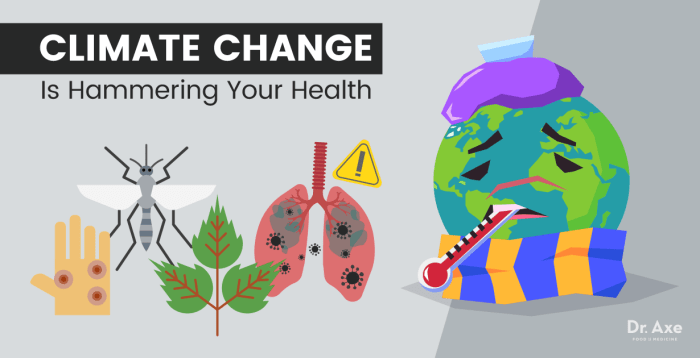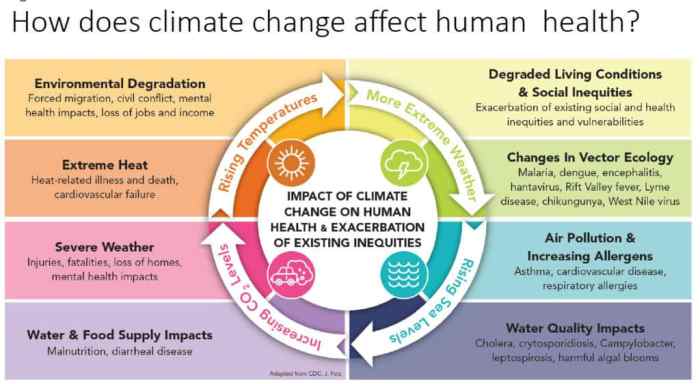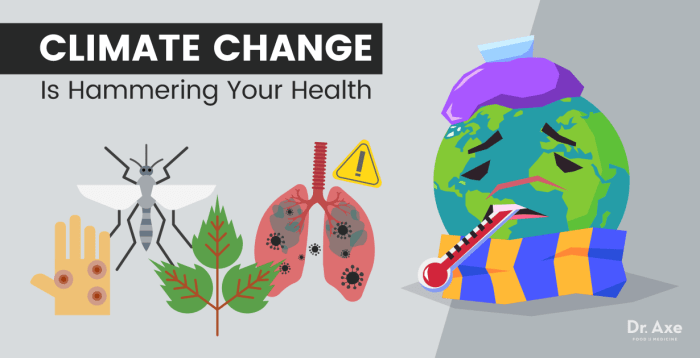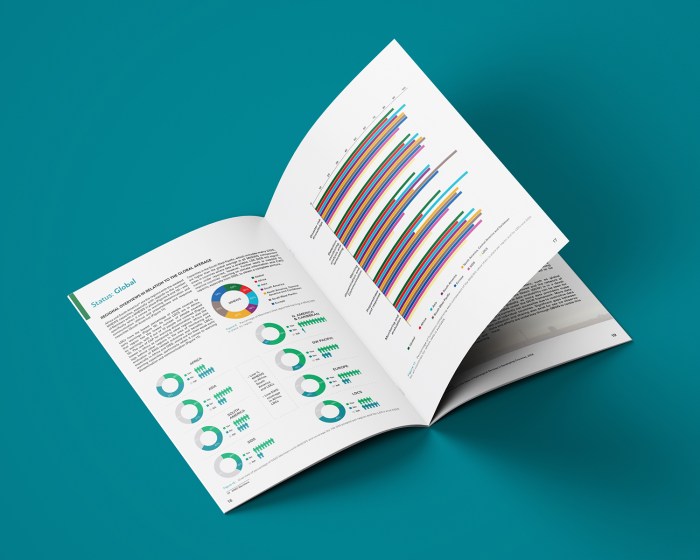
How climate change affects your gut health is a complex and fascinating topic. Our gut microbiome, a community of trillions of bacteria, plays a crucial role in our overall well-being. This intricate ecosystem is deeply connected to our environment, and changes in the climate are undeniably impacting our diets and overall health, affecting our gut microbiome in surprising ways.
From shifts in food availability to increased stress levels, climate change is altering our daily lives and impacting the very foundation of our gut health.
This article delves into the intricate relationship between climate change and gut health, exploring the ways in which our changing environment is altering our dietary habits, increasing stress, and potentially leading to a rise in gut-related issues. We’ll examine the impact of climate-related stressors, like extreme weather events, on our gut microbiome and how these shifts in the environment are affecting our diets and influencing our overall health.
Furthermore, we’ll explore potential strategies for adapting to these changes and mitigating their negative effects.
Introduction to Gut Health and Climate Change: How Climate Change Affects Your Gut Health
Our gut microbiome, the trillions of bacteria, fungi, and other microorganisms residing within our digestive system, plays a crucial role in our overall health. It influences digestion, nutrient absorption, immune function, and even brain health. This complex ecosystem is highly sensitive to environmental changes, and the increasing frequency and intensity of climate-related events are significantly impacting this delicate balance.The interconnectedness between the environment and our gut microbiome is profound.
Changes in food availability, water quality, and even exposure to pollutants can directly alter the composition and function of our gut microbiota. This, in turn, can affect our susceptibility to various health issues, from allergies and autoimmune diseases to mental health conditions. Dietary shifts, driven by climate change, are a critical factor in this relationship.
Dietary Changes Related to Climate Change
Climate change significantly alters agricultural practices and food production, leading to shifts in dietary availability and accessibility. These changes directly impact the composition of our gut microbiota, influencing our digestive health. Regions experiencing droughts or floods may see reduced access to specific fruits, vegetables, and proteins, potentially leading to dietary deficiencies. Changes in food production may also alter the nutritional content of common staples, with unforeseen consequences for gut health.
Potential Impacts of Climate Change Stressors
Extreme weather events, like floods and droughts, can disrupt food supply chains and lead to food insecurity. These situations can lead to malnutrition and dietary deficiencies, impacting the gut microbiome’s diversity and functionality. Furthermore, the increased frequency of extreme weather events may expose populations to increased levels of environmental toxins, further stressing the gut’s ability to maintain a healthy microbiome.
Comparison of Regional Diets and Gut Health
| Region | Typical Diet | Potential Impacts on Gut Health (Considering Climate Change) |
|---|---|---|
| Sub-Saharan Africa | High in starchy staples, legumes, and some fruits and vegetables, but often lacking in protein and micronutrients. | Potential for nutrient deficiencies impacting gut microbiota composition and function, potentially exacerbated by droughts and floods. |
| South Asia | Rich in grains, pulses, and vegetables, with variations based on specific regions. | Potential for dietary imbalances depending on regional variations and climate change-induced crop failures. Increased food prices may also reduce diversity. |
| North America | Predominantly high in processed foods, animal products, and refined carbohydrates. | Potential for reduced gut microbiome diversity and increased susceptibility to inflammatory bowel disease (IBD) and other gut-related conditions, especially with reduced access to fresh produce. |
| South America | Varied diets, ranging from traditional plant-based to meat-heavy, depending on location. | Potential for changes in dietary patterns due to climate-related crop failures, especially impacting populations heavily reliant on agricultural output. |
This table highlights the potential impact of dietary shifts related to climate change on gut health in different regions. The potential impacts range from nutrient deficiencies to shifts in the diversity and functionality of the gut microbiome, which can increase susceptibility to diseases.
Mechanisms of Climate Change Impacts on Gut Microbiota
Climate change stressors, including extreme weather events and food insecurity, can disrupt the gut microbiome’s delicate balance in several ways. The altered availability and nutritional content of food can directly impact the types and quantities of microorganisms that thrive in the gut. Exposure to increased environmental toxins, as a result of extreme weather events, can damage the gut lining and impair its ability to maintain a healthy microbiome.
Dietary Shifts and Gut Microbiome
Climate change is dramatically altering agricultural landscapes and food systems, impacting not only our access to nutritious foods but also the very composition of our gut microbiomes. These changes are intricately linked, creating a complex interplay between environmental shifts and our internal health. The availability of certain foods, the methods of their cultivation, and the prevalence of processed options are all profoundly influenced by the changing climate, ultimately affecting the diversity and function of the bacteria residing within our digestive tracts.The very foundation of our diets is shifting.
Reduced access to fresh produce due to extreme weather events and droughts can lead to dietary deficiencies. Increased reliance on processed foods, often lacking in fiber and beneficial microbes, is another consequence. These alterations are more than just a matter of convenience; they have profound effects on the intricate ecosystem within our guts.
Changes in Food Availability and Agricultural Practices
Climate change is impacting agricultural practices in numerous ways. Droughts, floods, and extreme temperatures directly affect crop yields and livestock production. These disruptions lead to fluctuations in food prices and availability, particularly for fresh produce. This instability forces dietary shifts, often towards readily available, less nutritious options. For example, a region experiencing prolonged drought might see a decrease in the production of leafy greens, forcing residents to rely more on processed foods or substitute vegetables with higher water content.
This shift in the types of foods consumed can have long-term consequences for gut health.
Impact of Increased Reliance on Processed Foods
The increased reliance on processed foods is a significant concern for gut health. These foods are often low in fiber, which is crucial for the growth and activity of beneficial gut bacteria. Moreover, the processing methods used often destroy or alter the natural compounds and nutrients that support a healthy gut microbiome. High levels of added sugars, unhealthy fats, and artificial ingredients in processed foods contribute to an imbalance in gut bacteria, leading to inflammation and potentially chronic health problems.
Reduced Access to Fresh Produce
Fresh produce is a cornerstone of a healthy diet, providing essential vitamins, minerals, and fiber that promote a diverse and balanced gut microbiome. Climate change-related events, like extreme weather, soil degradation, and water scarcity, directly impact the production and availability of fresh produce. This reduction in access not only deprives individuals of crucial nutrients but also creates a gap in the types of foods that support a healthy gut flora.
For example, areas experiencing severe droughts may see a decrease in the production of fruits and vegetables, potentially leading to nutrient deficiencies and an imbalance in gut microbiota.
Shifts in Food Sources
Changing climates can also affect the types of foods available. For instance, the spread of pests and diseases may affect the quality and availability of certain crops. In some regions, the growing seasons may shift, making certain fruits and vegetables less accessible. These shifts in food sources can disrupt the dietary patterns and impact the gut microbiome by reducing the diversity of nutrients and fiber consumed.
Comparison of Different Dietary Patterns on Gut Microbiota Composition
Different dietary patterns have distinct effects on gut microbiota composition. A diet rich in fiber, fruits, and vegetables promotes a diverse and balanced microbiome, characterized by a higher abundance of beneficial bacteria. Conversely, a diet high in processed foods, refined sugars, and unhealthy fats can lead to a less diverse microbiome, with an overgrowth of potentially harmful bacteria.
The long-term consequences of these imbalances can range from digestive issues to increased susceptibility to diseases.
Potential Strategies for Maintaining a Healthy Gut Microbiome
Maintaining a healthy gut microbiome in the face of climate change-related dietary shifts requires a multifaceted approach. This includes promoting sustainable agricultural practices, supporting local farmers markets, and educating communities about the importance of a balanced diet. Consuming a variety of foods, including fruits, vegetables, whole grains, and legumes, can help maintain a diverse gut microbiota.
Nutritional Value of Food Sources Affected by Climate Change
| Food Source | Nutritional Value (Example) | Impact on Gut Bacteria |
|---|---|---|
| Leafy Greens (Spinach, Kale) | High in vitamins K, A, C, fiber | Supports beneficial bacteria, promotes healthy digestion |
| Fruits (Apples, Berries) | High in fiber, antioxidants | Promotes diversity of gut microbiota, supports gut health |
| Legumes (Beans, Lentils) | High in fiber, protein | Provides prebiotics for beneficial bacteria, promotes gut health |
| Whole Grains (Brown Rice, Oats) | High in fiber, complex carbohydrates | Provides fuel for beneficial bacteria, promotes healthy digestion |
| Processed Foods (Fast Food, Packaged Snacks) | Low in fiber, high in added sugars and unhealthy fats | Can lead to imbalance in gut bacteria, potentially impacting gut health |
Stressors and Gut Health
Our gut microbiome, a complex ecosystem of trillions of microorganisms, plays a vital role in our overall health. However, environmental stressors stemming from climate change can significantly disrupt this delicate balance, impacting gut health in profound ways. These stressors, from extreme weather events to mental health challenges, can trigger physiological responses that directly affect the gut’s composition and function.
Understanding these connections is crucial for developing strategies to mitigate the negative impacts of climate change on human well-being.Environmental stressors related to climate change, such as heatwaves, floods, and drought, induce significant physiological stress responses. These responses, including elevated cortisol levels, can disrupt the delicate balance of the gut microbiome. Prolonged exposure to these stressors can lead to chronic inflammation and impaired gut barrier function, making individuals more susceptible to various health issues.
Impact of Extreme Weather Events
Extreme weather events, like heatwaves and floods, trigger acute stress responses in the body. These responses, characterized by the release of stress hormones, significantly influence the gut microbiome. Elevated cortisol levels can alter the composition of beneficial and harmful bacteria, leading to a shift in the overall balance. Furthermore, the disruption of access to clean water and sanitation during floods can increase the risk of infection, potentially impacting the gut microbiome through the introduction of pathogenic microorganisms.
Ever wondered how climate change impacts your gut health? Well, it’s more complex than you might think. A recent study highlights the link between environmental stressors, like extreme weather events, and the gut microbiome’s balance. This disruption, in turn, can lead to various health issues. For example, the recent New York Knicks vs.
Indiana Pacers NBA playoffs Eastern Conference Finals Game One collapse, while a sporting event, might be viewed as a metaphor for the gut’s sensitivity to environmental imbalances. This unexpected turn of events demonstrates how seemingly unrelated things can affect our systems. Ultimately, understanding these interconnected factors is crucial for protecting our overall well-being, including the delicate ecosystem within our own bodies.
The altered gut environment can, in turn, exacerbate existing health conditions and increase susceptibility to illness.
Stress Hormones and Gut Microbiome
Stress hormones, such as cortisol, play a crucial role in regulating the body’s response to stress. Elevated levels of cortisol can negatively impact the gut microbiome by altering the growth and diversity of bacterial species. This disruption in microbial composition can lead to reduced production of beneficial metabolites, impacting nutrient absorption and overall gut health. Chronic stress, a common consequence of prolonged exposure to climate-related stressors, can further exacerbate these negative effects.
The cumulative impact of stress hormones on the gut microbiome underscores the importance of managing stress for overall health, especially in a changing climate.
Climate Change-Related Mental Health Concerns
Climate change-related anxieties and mental health concerns, such as increased fear of environmental disasters, are emerging as significant stressors. These anxieties can lead to chronic stress, which, as mentioned previously, can significantly impact the gut microbiome. The resulting imbalance in the gut microbiota can lead to an increased susceptibility to mental health issues and worsen existing conditions. The interplay between mental and gut health in the context of climate change highlights the need for holistic approaches to address the multifaceted impacts of this global crisis.
Environmental Toxins and Pollutants
Climate change can alter the distribution and concentration of environmental toxins and pollutants. Increased flooding can contaminate water sources with heavy metals and other pollutants, potentially impacting the gut microbiome. Moreover, changes in temperature and precipitation patterns can lead to increased exposure to air pollutants, which can have detrimental effects on gut health. The absorption of these pollutants through the gut can lead to inflammation and oxidative stress, further disrupting the delicate balance of the gut microbiota.
These toxins can also disrupt the delicate balance of the gut microbiota, impacting its diversity and function.
Correlation Table
| Climate-Related Stressors | Measurable Changes in Gut Health Indicators |
|---|---|
| Heatwaves | Increased cortisol levels, altered gut microbiota composition, reduced beneficial bacterial species, increased intestinal permeability |
| Floods | Increased exposure to pathogens, contamination of water sources with pollutants, altered gut microbiota composition, inflammation |
| Drought | Reduced access to clean water, potential for increased food insecurity, stress-related changes in gut microbiota, reduced nutrient intake |
| Mental Health Concerns (related to climate change) | Increased stress hormones (cortisol), altered gut microbiota composition, increased susceptibility to mental health issues, worsening of existing conditions |
Impact on Specific Gut Conditions

Climate change isn’t just affecting the weather; it’s also subtly altering the very landscape of our gut health. Changes in temperature, precipitation patterns, and agricultural practices are interconnected with the prevalence and severity of various gut disorders. This intricate relationship is a critical area of concern for public health.The interconnectedness of climate change and gut health is complex.
Warmer temperatures, for example, can lead to more frequent and intense heat waves, which can strain our bodies and negatively affect our immune systems. This weakened immune response can make us more vulnerable to infections that can manifest as gut disorders. Furthermore, changes in water quality and food availability directly impact the types and quality of food we consume, potentially triggering or exacerbating existing gut conditions.
Influence on Inflammatory Bowel Disease (IBD)
Climate change’s impact on IBD risk is likely multifaceted. Studies have linked increased stress levels, frequently associated with climate-related disasters, to exacerbations of existing IBD. Extreme weather events, like floods and droughts, can disrupt access to clean water and sanitation, increasing the risk of infections that could trigger or worsen IBD symptoms. The stress of displacement and loss of livelihoods due to climate change can also lead to increased stress hormones, which may further contribute to inflammation in the gut.
Impact on Irritable Bowel Syndrome (IBS)
The relationship between climate change and IBS is less direct than with IBD. However, the disruption of normal routines and stress associated with climate-related events are potential triggers for IBS symptoms. Increased air pollution, another consequence of climate change, may also contribute to the development or worsening of IBS. Air pollutants can trigger inflammation throughout the body, potentially impacting the gut.
For example, the increased frequency and intensity of pollen seasons could exacerbate symptoms in susceptible individuals.
Climate Change and Foodborne Illnesses, How climate change affects your gut health
Changes in agricultural practices and food distribution systems, driven by climate change, can significantly impact the prevalence of foodborne illnesses. Rising temperatures can alter the conditions that support the growth of pathogens in food. Increased flooding and rainfall can contaminate crops and water sources, increasing the risk of waterborne illnesses, which can manifest as severe gut infections.
Specific Food Sources and Gut Infections
Climate change alters the suitability of growing certain crops. For example, prolonged droughts can reduce the quality and nutrient content of crops, increasing the risk of gut infections. Certain crops may be grown in less suitable areas or become contaminated with pathogens due to changes in water availability and sanitation. This affects the quality and safety of the food, which, in turn, impacts the health of the gut microbiome.
Ever wondered how climate change impacts your gut health? It’s a surprisingly complex connection. From disrupted food supplies and increased exposure to toxins to changes in agricultural practices, the effects ripple outwards. This, in turn, impacts our digestive systems. This recent news about US student visa interviews being paused at embassies due to Trump-era social media vetting, here , highlights the unforeseen consequences of policy decisions.
Ultimately, though, the connection between our environment and our gut health is undeniable, and worth exploring further.
Table of Potential Gut Health Issues Associated with Climate Change
| Gut Health Issue | Associated Risk Factors |
|---|---|
| Inflammatory Bowel Disease (IBD) | Increased stress from climate events, disrupted access to clean water and sanitation, changes in food quality |
| Irritable Bowel Syndrome (IBS) | Disrupted routines, stress, increased air pollution, changes in pollen seasons |
| Foodborne illnesses | Altered conditions supporting pathogen growth in food, contamination of crops and water sources, reduced nutrient content of crops |
| Waterborne illnesses | Contaminated water sources, increased flooding, changes in water quality |
| Other gut disorders | Disruptions to normal routines, stress, and environmental changes |
Adaptation Strategies and Mitigation
Climate change is profoundly impacting our gut health, and understanding how to adapt and mitigate these effects is crucial. From shifts in dietary availability to increased stress levels, the challenges are multifaceted. By embracing sustainable practices and supporting resilient food systems, we can enhance gut health resilience and minimize the negative consequences of a changing climate.Our food choices, lifestyle, and the agricultural systems that feed us are interconnected with the health of our gut microbiomes.
Adapting to a changing climate means actively seeking strategies that promote gut resilience and contribute to a more sustainable future.
Dietary and Lifestyle Changes for Enhanced Gut Resilience
Maintaining a healthy gut microbiome requires a holistic approach that considers both diet and lifestyle. Climate change-related food insecurity and altered agricultural practices can disrupt our usual dietary patterns, necessitating adaptable strategies. Implementing these changes can improve gut health and reduce the negative impacts of climate change.
- Prioritize whole, unprocessed foods:
- Focus on nutrient-rich fruits, vegetables, and whole grains.
- Limit processed foods, sugary drinks, and excessive red meat.
- Incorporate prebiotic foods such as garlic, onions, bananas, and asparagus to nourish beneficial gut bacteria.
- Optimize hydration by drinking plenty of clean water throughout the day.
- Engage in regular physical activity to promote gut motility and reduce stress.
- Prioritize sufficient sleep for overall health and gut function.
Importance of Supporting Sustainable Agriculture
The health of our gut is intrinsically linked to the health of our planet. Sustainable agricultural practices that prioritize soil health, biodiversity, and reduced pesticide use are vital for producing nutrient-rich foods that support a healthy gut microbiome.
- Supporting local farmers markets and community-supported agriculture (CSA) programs can enhance access to fresh, seasonal produce.
- Choosing fruits and vegetables that are in season minimizes the environmental footprint associated with transportation.
- Promoting diversified farming methods supports a wider variety of nutrient-rich crops.
- Supporting policies that incentivize sustainable farming practices, such as reduced fertilizer use and responsible water management, are crucial.
Role of Public Health Interventions
Public health initiatives can play a significant role in promoting gut health resilience in the face of climate change. These interventions should be designed to educate individuals about the interconnectedness of diet, lifestyle, and the environment.
Ever wondered how climate change might be impacting your gut microbiome? Turns out, it’s a complex connection. Recent studies suggest that changes in food availability and agricultural practices due to climate shifts could be altering the types of bacteria living in our digestive systems. This is fascinating, especially when considering the recent Netflix series, “Sirens,” and how its ending explores themes of interconnectedness.
Sirens Netflix ending explained highlights similar ideas about the intricate ways our choices impact the environment, ultimately affecting us all. So, maybe that gut health issue you’re experiencing isn’t so random after all. It might be time to consider the larger picture, and how our actions affect our planet and our own internal ecosystems.
- Public health campaigns should emphasize the importance of a diverse and plant-based diet for gut health and environmental sustainability.
- Education programs can help individuals understand the impact of climate change on food production and their own gut health.
- Community gardens and urban farming initiatives can provide access to fresh produce and promote sustainable food systems.
- Public health initiatives can highlight the link between stress, gut health, and climate change impacts, providing support and resources for managing stress.
Preventative Measures for Individuals and Communities
Taking preventative measures to mitigate the negative impacts of climate change on gut health requires a collective effort from individuals and communities.
- Reducing food waste can minimize the environmental impact of food production and ensure consistent access to healthy foods.
- Planning meals in advance and creating a shopping list to avoid impulse purchases can reduce food waste and promote mindful consumption.
- Understanding local food systems and supporting sustainable practices in local communities can contribute to a healthier food environment.
- Participating in community initiatives to promote sustainable food systems and access to nutritious foods can foster collective action and awareness.
Practical Tips for Dietary and Lifestyle Adaptation
The following table Artikels practical tips for adapting diet and lifestyle to mitigate the impact of climate change on gut health.
| Category | Action | Benefit |
|---|---|---|
| Diet | Increase consumption of fruits and vegetables | Provides essential nutrients and promotes gut health |
| Diet | Choose locally sourced and seasonal produce | Reduces environmental impact and supports local farmers |
| Lifestyle | Reduce stress levels through mindfulness and relaxation techniques | Reduces inflammation and supports gut health |
| Lifestyle | Prioritize sufficient sleep | Supports overall health and gut function |
| Lifestyle | Engage in regular physical activity | Promotes gut motility and reduces stress |
Future Research Directions

The intricate link between climate change and gut health necessitates further investigation to fully grasp its multifaceted implications. Understanding the long-term consequences of these interactions is crucial for developing effective preventative and therapeutic strategies. This exploration requires a multi-pronged approach, encompassing personalized interventions and interdisciplinary collaborations to address this complex challenge.
Personalized Gut Health Strategies
The gut microbiome is highly individualistic, meaning that responses to environmental stressors, including climate change, vary significantly from person to person. Therefore, personalized strategies for maintaining gut health in the face of climate change are essential. Future research should focus on identifying specific genetic and environmental factors that influence individual responses to climate-related dietary shifts and stress. This individualized approach can lead to targeted interventions that optimize gut health in the context of a changing climate.
Interdisciplinary Collaboration
Addressing the intricate relationship between climate change and gut health necessitates a collaborative effort from various disciplines. Collaboration between nutritionists, microbiologists, gastroenterologists, climatologists, and public health experts can provide a holistic perspective on this complex issue. Such interdisciplinary partnerships can leverage the unique expertise of each field to develop comprehensive solutions and translate research findings into practical applications.
For example, a study involving climate scientists, nutritionists, and microbiologists could investigate how changes in regional agricultural practices affect the composition of food sources and subsequently the gut microbiome.
Long-Term Effects Assessment
Research should investigate the long-term effects of climate change on gut health. This involves monitoring the evolution of gut microbiota composition and function over extended periods in various populations exposed to different climate-related stressors. For instance, longitudinal studies can assess the cumulative impact of repeated heat waves or altered food availability on gut health outcomes, such as the prevalence of inflammatory bowel disease.
This longitudinal research will help identify potential long-term health consequences and inform preventive strategies.
Specific Research Questions
| Research Area | Specific Research Questions |
|---|---|
| Dietary Shifts and Gut Microbiome | How do changes in the availability and nutritional content of locally grown foods, due to climate change, impact the gut microbiome composition and diversity in different populations? |
| Stressors and Gut Health | What is the relationship between chronic stress induced by climate change-related events (e.g., extreme weather) and the development of gut-related conditions, such as irritable bowel syndrome? |
| Impact on Specific Gut Conditions | How do shifts in dietary patterns due to climate change exacerbate existing gut conditions like inflammatory bowel disease and celiac disease? |
| Personalized Strategies | Can we develop predictive models to identify individuals most susceptible to climate change-related gut health issues based on their genetic profile and environmental exposure? |
| Long-Term Effects | What are the long-term impacts of prolonged exposure to specific climate-related stressors on the stability and diversity of the gut microbiome in vulnerable populations? |
Ultimate Conclusion
In conclusion, the connection between climate change and gut health is undeniable. From altered diets to increased environmental stressors, the impacts are significant. Understanding these intricate links is crucial for developing effective strategies to protect our gut health in the face of a changing climate. This article highlighted the importance of sustainable food systems, stress management, and overall well-being in safeguarding our gut microbiome.
The future of our gut health is intertwined with the future of our planet. By taking proactive steps, we can all contribute to a healthier gut and a healthier planet.





